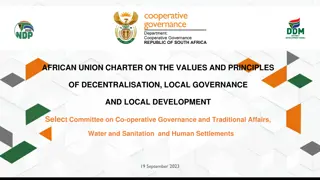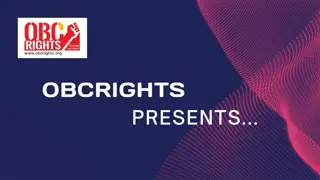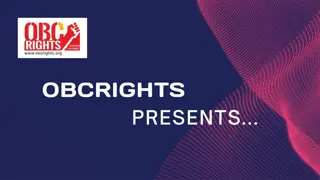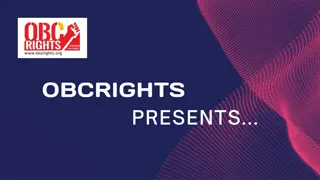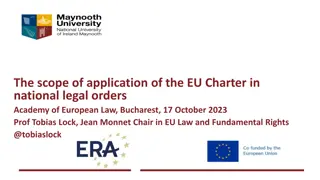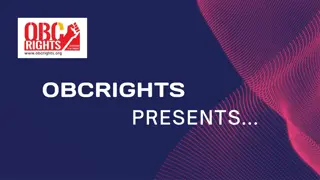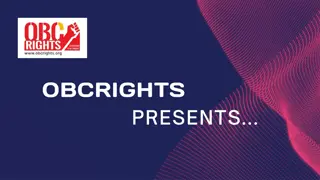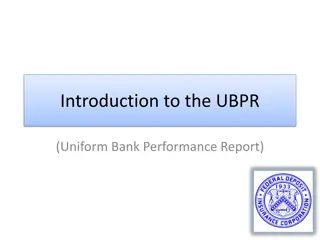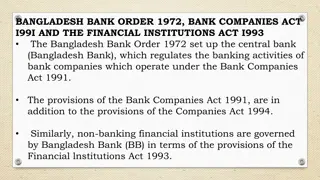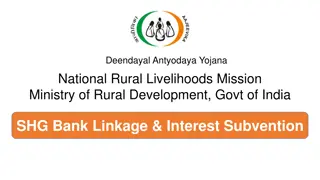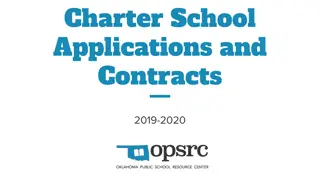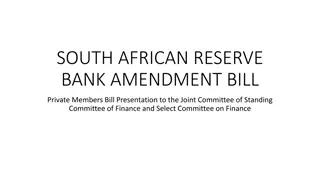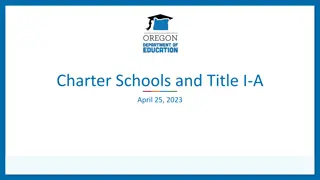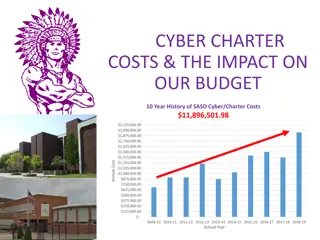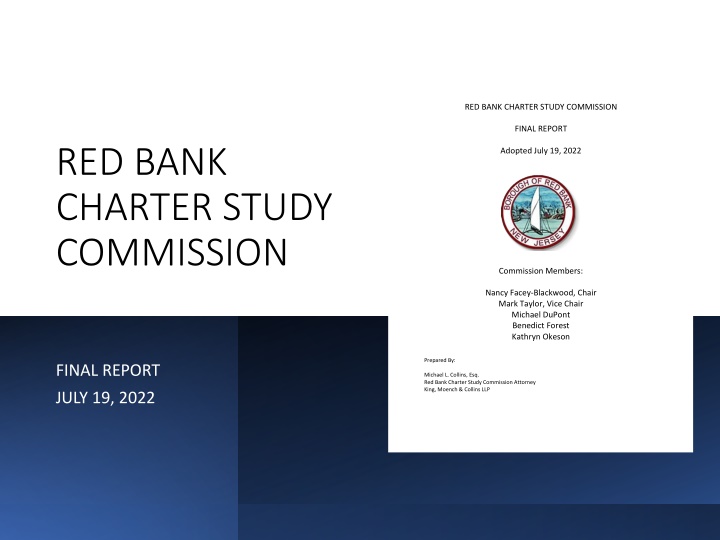
Red Bank Charter Study Commission Findings and Recommendations
The Red Bank Charter Study Commission, after thorough review and public engagement, has identified structural deficiencies in the current Borough form of government, prompting a recommendation for potential improvements to better serve the needs of Red Bank. Explore the detailed findings and analysis presented in the Commission's final report adopted on July 19, 2022.
Download Presentation

Please find below an Image/Link to download the presentation.
The content on the website is provided AS IS for your information and personal use only. It may not be sold, licensed, or shared on other websites without obtaining consent from the author. If you encounter any issues during the download, it is possible that the publisher has removed the file from their server.
You are allowed to download the files provided on this website for personal or commercial use, subject to the condition that they are used lawfully. All files are the property of their respective owners.
The content on the website is provided AS IS for your information and personal use only. It may not be sold, licensed, or shared on other websites without obtaining consent from the author.
E N D
Presentation Transcript
RED BANK CHARTER STUDY COMMISSION FINAL REPORT Adopted July 19, 2022 RED BANK CHARTER STUDY COMMISSION Commission Members: Nancy Facey-Blackwood, Chair Mark Taylor, Vice Chair Michael DuPont Benedict Forest Kathryn Okeson Prepared By: Michael L. Collins, Esq. Red Bank Charter Study Commission Attorney King, Moench & Collins LLP FINAL REPORT JULY 19, 2022
EXECUTIVE SUMMARY RECOMMENDATION OF THE COMMISSION PUBLIC QUESTION FINAL REPORT CONTENTS BACKGROUND AND ESTABLISHMENT OF COMMISSION (Phase 1) REVIEW OF CURRENT FORM OF GOVERNMENT (Phase 2) REVIEW OF ALTERNATE FORMS OF GOVERNMENT (Phase 3) COMMISSION FINDINGS
EXECUTIVE SUMMARY The people of Red Bank voted overwhelmingly by a 70% margin to establish a charter study commission. The Commission viewed this as a mandate to closely examine Red Bank s Borough form of government which has existed over one century and determine whether a newer form of government should guide Red Bank through its second century.
EXECUTIVE SUMMARY Over the past nine months, the Commission has educated itself and the public by conducting numerous interviews of current and former Red Bank governing body members, current and former business administrators, current employees, a political scientist, local government experts, and elected officials from other municipalities. The Commission also received public comment at meetings, through written submissions, and informally made to individual commissioners.
EXECUTIVE SUMMARY The Commission finds that the Borough form of government is not meeting the needs of Red Bank. While it can be debated whether certain inefficiencies are caused by the form of government or its officeholders, the Commission finds that the Borough form itself presents two clear structural deficiencies that can be improved upon.
EXECUTIVE SUMMARY First, the Borough form lacks sufficient delineations of authority for officeholders, which has allowed councilmembers to meddle, micromanage, and overstep their role as individual legislators. The Borough form indiscriminately vests executive responsibilities in the collective mayor and council and contains an optional business administrator, allowing the latter role to be altered by the whims of council. The Borough form s inefficiency is compounded by the governing body being nominally led by a weak mayor that only casts tie- breaking votes. The Borough form of government lacks defined and effective roles for the mayor, councilmembers, and administrator, which are required for Red Bank s government to operate efficiently in the 21st century.
EXECUTIVE SUMMARY Second, the Borough form s annual partisan elections have created a divisive environment that has undermined Red Bank s government from properly functioning. The high frequency of elections prevents the council from embarking upon long-term projects without being impeded by short-term political considerations. The partisan system has caused elected officials to oppose the other party's ideas for strictly political reasons in divided government, and when there is one-party control, there has been in-fighting on public display that has prevented consensus building.
EXECUTIVE SUMMARY After reviewing the options available to it, the Commission recommends that Red Bank adopt the Council-Manager form of government with non-partisan elections, as further detailed in this Report.
EXECUTIVE SUMMARY The Council-Manager form allows a directly elected mayor to serve as the head of government and as a voting member of the council not just a tie-breaker. The mayor and council exercise all legislative powers and set the policy for Red Bank. In turn, the mayor and council hire a manager to run the day-to-day municipal operations. The manager carries out the executive functions, and the mayor and council are required to act through the manager. The Commission believes this structure will directly address and rectify the micromanagement issues that have been seen in the current Borough form.
EXECUTIVE SUMMARY The Commission also believes that non-partisan elections will improve Red Bank s electoral process. The Commission finds that the current partisan elections have led to biannual division and acrimony. Nonpartisan elections will allow any candidate to run for office by filing a petition, counteracting the outsized influence of party endorsements and favorable ballot position, which has directly affected the council s governance in recent years. Those elected would serve four-year terms, with elections staggered every two years.
EXECUTIVE SUMMARY The Commission will be submitting its recommendation to voters in this November s general election. If adopted, voters will elect a new government in May 2023. This timing ensures that the newly-adopted government takes effect as soon as possible, rather than waiting for a November 2023 election that would allow the Borough government to operate in lame duck status for over a year. It will also allow the new governing body to be chosen in an election exclusively focused on Red Bank issues. The recommendation also provides for run-off elections in the unlikely event that candidates fail to attain a majority of votes for mayor and/or council. After the new government is installed on July 1, 2023, it may choose to move future municipal elections to November, which this Commission recommends that it do.
EXECUTIVE SUMMARY The Commission hopes that the breadth of this Report demonstrates the seriousness by which it took its obligations and the amount of thought that has gone into the recommendation it makes. The Commission remains grateful to the people of Red Bank for this unique opportunity to look into and improve our local government, and to those who assisted the Commission through this process, especially each of the parties that provided interviews to the Commission and the residents of Red Bank that offered public comments.
REFERENDUM IN NOVEMBER THE CHARTER STUDY COMMISSION RECOMMENDS AN ALTERNATIVE FORM OF GOVERNMENT. THE RECOMMENDATION WILL BE CONSIDERED AS A PUBLIC QUESTION ONTHE NOVEMBER GENERAL ELECTION. VOTERS WILL HAVE THE OPPORTUNITY TO CONSIDER AND APPROVE THE RECOMMENDATION.
COUNCIL-MANAGER FORM MAYOR AND SIX COUNCILMEMBERS SAME AS BOROUGH FORM MAYOR NOW SERVES AS A VOTING MEMBER OF COUNCIL MAYOR AND COUNCIL HIRE A MANAGER TO RUN THE DAY-TO-DAY OPERATIONS, WHO IS SUBJECT TO REMOVAL BY A SIMPLE MAJORITY GOVERNING BODY MEMBERS PROHIBITED FROM ACTING EXCEPT THROUGH THE MANAGER ALL ELECTED AT-LARGE; MAYOR DIRECTLY ELECTED MAYOR NOW SERVES AS A VOTING MEMBER OF COUNCIL
NON-PARTISAN ELECTIONS CANDIDATES DO NOT RUN WITH PARTY AFFILIATIONS LISTED ON THE BALLOT CANDIDATES MAY LIST A SLOGAN ON THE BALLOT THAT DOES NOT EXCEED SIX WORDS, THOUGH THE TERMS CANNOT IDENTIFY PARTY AFFILIATION
MAY MUNICIPAL ELECTION IF REFERENDUM APPROVED, NEW GOVERNING BODY WOULD BE ELECTED IN MAY 9, 2023 MUNICIPAL ELECTION. THIS ALLOWS A NEW GOVERNING BODY TO BE ELECTED AS SOON AS FEASIBLE UNDER FAULKNER ACT. A NOVEMBER ELECTION WOULD LEAVE REJECTED BOROUGH FORM IN PLACE FOR OVER A YEAR, AND OVERALL CHARTER STUDY PROCESS WILL HAVE TAKEN OVER 2.5 YEARS. NEW GOVERNING BODY CAN EVALUATE MOVING ELECTIONS TO NOVEMBER.
RUNOFFS IF A SUFFICIENT NUMBER OF CANDIDATES DO NOT RECEIVE A MAJORITY OF VOTES, THERE WOULD BE A RUNOFF ELECTION AMONG THE TOP CANDIDATES THIS ENSURES THAT A CANDIDATE RECEIVES MORE THAN 50% OF THE VOTE
IMPLEMENTATION THE NEW GOVERNMENT WOULD BEGIN ON JULY 1, 2023. ALL CURRENT ORDINANCES AND RESOLUTIONS REMAIN IN EFFECT, EXCEPT THOSE INCONSISTENT WITH THE NEW COUNCIL-MANAGER FORM OF GOVERNMENT. TERMS OF ALL BOROUGH ELECTED AND APPOINTED OFFICIALS CEASE WITH CERTAIN EXCEPTIONS. NEW GOVERNMENT TASKED WITH UPDATING CODE AND MAKING INTERIM AND NEW APPOINTMENTS




